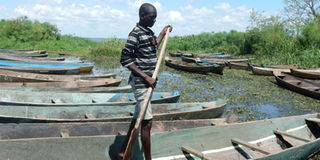Hunger: More than 1,000 pupils quit school to fish

Desperate. A pupil at Kayei Landing Site in Apac District prepares to go fishing in Lake Kyoga recently. PHOTO BY BILL OKETCH
What you need to know:
- Survival. Local authorities said desperate school children in most rural areas abandoned school to search for fish in the nearby Lake Kyoga as alternative meals for their families.
AMOLATAR/APAC. An estimated 1,095 pupils in primary schools in Apac and Amolatar districts dropped out of school last term due to hunger as starvation in the drought prone districts reaches worrying levels.
Local authorities said desperate school children in most rural areas abandoned school to search for fish in the nearby Lake Kyoga as alternative meals for their families.
A mini-survey conducted by this newspaper in three schools in Namasale Sub-county in Amolatar recently found that 1,095 pupils did not sit end of term exams.
For instance, more than 350 pupils out of 700 children enrolled at Olyaka Primary School did not sit for end of first term exams.
Awikori Primary School on the other hand opened term one with 600 pupils but closed with only 290 pupils.
At least 435 out of 625 pupils that are enrolled at Burakwana Primary School abandoned school.
Mr Fred Ogwang, a former LC3 councillor in Amolatar, said most children have resorted to fishing to feed their hungry parents.
Namasale Sub-county chairperson Rambo Ongu said the challenge cuts across the entire eight primary schools in the area.
“Some children are saying government should not deny them access to the lake because they cannot study on empty stomachs. They say the government should shut down all the schools in the area,” Mr Ongu told Daily Monitor on phone on Tuesday.
Following the on-going food shortage, parents who would have otherwise provided food for their families, have also become vulnerable with many now surviving on relief food provided by the government.
Local leaders have appealed to government to use food to lure pupils back to school.
“Parents will send children to pick food rations and the teachers will end up retaining the children at school,” Mr Ongu explained.
Mr Patrick Otile, the Western Ward LC1 chairperson, recently told this newspaper that the geographical location of Amolatar has subjected many to think that life is all about fishing.
“Many children have grown up thinking that life is all about fishing, ignoring education,” he said.
With the recent ferry development at Namasale, children now go to carry passengers’ baggage and are reportedly paid between Shs100 and Shs300 for the job.
Former Namasale Town Council Beach Management Unit chairman, Mr Geoffrey Opio, said some parents have failed to take their children to school given the nature of the environment.
Social workers warned that it is disastrous for the community not to embrace education. For instance, they said if children don’t study, they will have no knowledge to sustain them in future which will make them to become thieves.
“It also means that we are not going to have a population which is productive,” said Ms Joyce Ajok.
An opinion leader at Kayei Landing Site, Akokoro Sub-county in Apac, Mr Herbert Ogwal, noted that as a result of parents’ negligence, children find themselves without basic needs of life.
“The other challenge is that many parents do not know that apart from fishing, there are other income generating activities that they can engage in to make ends meet,” he said.
The district education officials said efforts are being made to ensure that parents are mobilised to take their children to school.
However, Mr Opio said most parents are not cooperating with local leaders.
“It is somehow a challenge to us because if you try to take some action against the parents, they think you are a burden to them,” he said.


